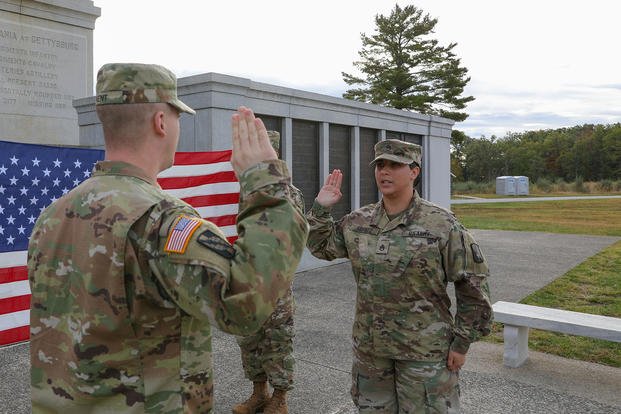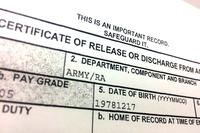With 10 years of war winding down, the focus is now, more than ever, on retention of quality soldiers. Beginning March 1, if a soldier's estimated termination of service is between Oct. 1, 2012, and Sept. 30, 2013, he or she can reenlist between now and Sept 30 of this year.
Accompanying this opportunity to continue in the Army, new policies allow brigade commanders to make a life-altering decision without sending a recommendation up to the commander of Human Resources Command.
"The Army instituted additional reasons for a mandatory bar to reenlistment," said Jim Bragg, chief of the Retention and Reclassification Branch at Human Resources Command.
"We're just reminding commanders that they have tools out there to identify substandard soldiers and have the responsibility to give them a road map for success to stay in the Army. Commanders should deny retention to those who fail to demonstrate potential for continued service. The Army wants commanders to identify soldiers who deserve the privilege of serving," Bragg said.
"For instance, if a soldier's ETS (expiration of term of service) is 10 months from now and the commander says, 'You do not show potential for future service,' all leaders must ensure they outline a plan of action for that soldier to overcome his/her shortcomings.
"Just as we trust the brigade commanders to take these soldiers to war and execute, we can trust them to make the right decision for the Army," Bragg said.
On Feb. 2, Sgt. Maj. of the Army Raymond F. Chandler III, Army Chief of Staff Gen. Raymond T. Odierno and Secretary of the Army John M. McHugh signed a memo that specifically spells out these changes:
"Over the next few years, our Army will reduce its end strength and shape the force for future requirements. As we begin this deliberate process, it is imperative we retain those soldiers with the greatest potential for future service -- ones truly deserving to remain a part of our Army team.
"To help us get to our desired end strength, we will fundamentally change the active-component retention program. This will provide our brigade-level commanders the flexibility and agility needed to retain those who best meet the needs of our Army.
"Tough decisions are ahead," they said. "Some fully qualified soldiers will be denied reenlistment. Commanders must carefully assess their soldiers and ensure only (the) best are retained to meet the needs of (the) Army."
Said Bragg: "Brigade commanders have always been able to ensure they reenlist quality by using their flagging actions by saying, for instance, 'OK, you're overweight; you can't re-enlist until you meet the weight standards,' adding that this is the first time in recent history where brigade commanders have had the authority to deny reenlistment to soldiers who are fully qualified to re-enlist.
"Now, if the soldier meets all the quality standards that we say they have to -- (such as) pass the PT test, retention control points, meet height-weight standards and all the other things a soldier is supposed to do -- if that commander still feels the soldier is not deemed to have the potential to serve after completing a quality review of the 'Whole Soldier,' then they can deny retention," Bragg said.
Commanders have received specific implementation guidance from the Army G-1, addressing soldiers in over-strength, balanced and shortage military occupational specialties, known as MOSs.
In addition, guidance has instructed commanders to use the "Whole Soldier" concept when determining their best. This determination includes attributes, competencies, leadership potential, adherence to standards, duty performance and evaluations that demonstrate ability to serve in any MOS.
Under this guidance, some soldiers will be required to reclassify from over-strength career fields to under-strength, or balanced ones, to meet Army requirements. It is imperative that commanders and command sergeants major ensure soldiers receive performance counseling, officials said, as this will be one of the key tools of determining retention.
In this directive, specific retention policy changes are:
1. Brigade/O-6 level commanders and above have the authority to deny reenlistment to those soldiers not deemed best qualified. (Previously only the HRC commander had this authority.)
2. Increased retention standards for staff sergeant and above who have not executed an indefinite re-enlistment contract. Soldiers with the following are not eligible to reenlist without an exception to policy from HRC:
-- Relief-for-Cause NCO Evaluation Report
-- "No" listed in Part IV of an NCOER
-- Senior rating of "4" or "5" in Part V of NCOER
-- DA Form 1059 indicating failure of Non-Commissioned Officer Education System
3. Addition of mandatory reasons to initiate a bar to reenlistment:
-- Loss of Primary Military Occupational Specialties, or PMOS qualifications, due to fault of the soldier
-- Denied Command List Integration, or CLI, for promotion by unit commander
-- Drug/Alcohol incident within current enlistment
-- Two or more field-grade Article 15s during current enlistment
-- AWOL more than 96 hours during current enlistment
For more information on Army retention policies and procedures, soldiers should contact their unit career counselor for policy and processing guidance.
Interested in Joining the Military?
We can put you in touch with recruiters from the different military branches. Learn about the benefits of serving your country, paying for school, military career paths, and more: sign up now and hear from a recruiter near you.












